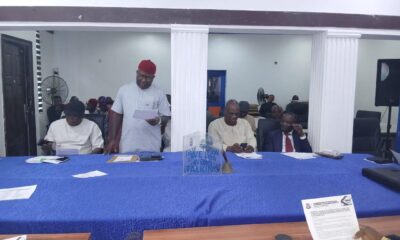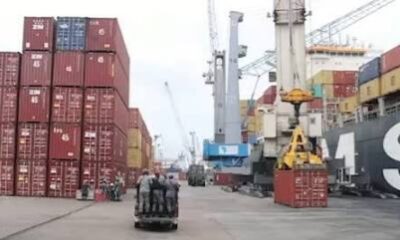Maritime
Nigeria’s Trade Transformation: SEREC Advocate Functional National Single Window

BY GBOGBOWA GBOWA
In the bustling corridors of Nigeria’s ports and border stations, a quiet revolution is brewing, one that could redefine the nation’s trade landscape and unlock billions in economic potential.
At the heart of this transformation lies the long-awaited National Single Window (NSW), a digital backbone poised to streamline cargo clearance, reduce bureaucracy, and elevate Nigeria’s global trade competitiveness.
In a position paper titled “Nigeria’s Path Toward Seamless Cargo Clearance – The Imperative of a Functional National Single Window (NSW)” the Sea Empowerment and Research Center (SEREC) takes a look at the journey from fragmentation to integration, and concluded that unless the NSW is functional, true transformation of the port economy would be a mirage.
SEREC says for decades, Nigeria’s trade facilitation efforts have been marked by fragmented systems and siloed agency operations. Platforms like Asycuda, PAAR/NICIS I & II, and the current B’Odogwu system have introduced incremental improvements, yet none have delivered the seamless interoperability that modern trade demands. Industry players — freight forwarders, terminal operators, shipping lines, and customs brokers — have long called for a unified digital interface that mirrors global best practices.
SEREC Head of Research, Fwrdr Eugene Nweke note that Singapore’s TradeNet system stands as a beacon. Its centralized “mailbox” architecture and pre-arrival clearance protocols have set the gold standard for efficiency, transparency, and stakeholder trust. Nigerian industry leaders recognize that emulating such a model requires more than software — it demands institutional coordination, policy alignment, and a shared commitment to trade facilitation over turf wars.
SEREC notes that despite commendable strides by the Nigeria Customs Service (NCS), the private sector continues to grapple with:
❌ Inter-agency rivalry and lack of system interoperability
❌ Frequent platform downtimes and integrity breaches
❌ Limited stakeholder engagement and weak private sector integration
❌ A policy focus skewed toward revenue generation rather than trade facilitation
The group urge the NTFC and NCS to ensure that the B’Odogwu platform evolves into a robust, interoperable foundation for the NSW. This means prioritizing homegrown expertise, aligning Incoterms with Nigeria’s import realities, and embedding performance-driven governance structures.
According to SEREC, while the numbers speak volumes in terms of Customs revenue surge from ₦3.2 trillion in 2023 to ₦6.105 trillion in 2024, with a projected target of up to ₦10 trillion for 2025; it expressed concern that inefficiencies continue to bleed the system of its full potential.

According to SEREC:
✅ A functional NSW could boost revenue by ₦600 billion–₦1.2 trillion annually
✅ Cargo dwell time could drop by 35–45%, saving ₦300–₦400 billion in logistics costs
✅ Trade transaction costs could fall by 20–25%, improving Nigeria’s global logistics index
For the private sector, this translates into faster turnaround times, reduced demurrage, and enhanced predictability — all critical for competitiveness in a region where ports in Cotonou, Lome, and Tema are already digitally harmonized.
The group further noted that beyond efficiency, the NSW promises a ripple effect across the economy:
*Over 100,000 direct and indirect jobs in ICT, logistics, and data management
*$2–$3 billion in private maritime and logistics investments within five years
*Up to 1.5% increase in GDP contribution from the maritime sector
Above, SEREC argued are not just numbers but represent real opportunities for Nigerian entrepreneurs, tech innovators, and logistics firms to thrive in a digitally enabled trade environment.
As January 2026 approaches, it is expected that the NSW must be more than an automation project. It must be a national reform anchored in transparency, inclusivity, and operational integrity.
SEREC’s bulletin echoes the sentiments of the sector — trade facilitation must come first; revenue will follow efficiency.
The time to act is now. Nigeria’s trading community stands ready to support a future where cargo clearance is seamless, systems are interoperable, and trade flows with the speed of trust.
































